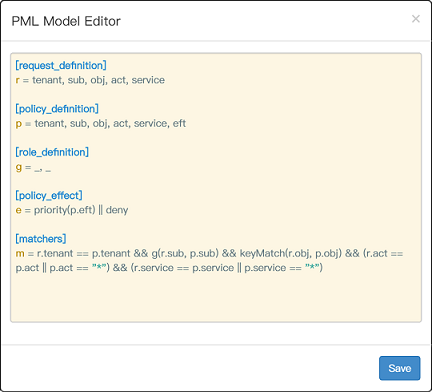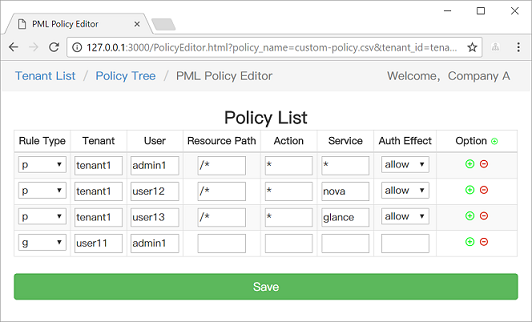PHP-Casbin
Documentation | Tutorials | Extensions
Breaking News: Laravel-authz is now available, an authorization library for the Laravel framework.
PHP-Casbin is a powerful and efficient open-source access control library for PHP projects. It provides support for enforcing authorization based on various access control models.
All the languages supported by Casbin:
 |
 |
 |
 |
|---|---|---|---|
| Casbin | jCasbin | node-Casbin | PHP-Casbin |
| production-ready | production-ready | production-ready | production-ready |
 |
 |
 |
 |
|---|---|---|---|
| PyCasbin | Casbin.NET | Casbin4D | Casbin-RS |
| production-ready | production-ready | experimental | production-ready |
Installation
Require this package in the composer.json of your project. This will download the package:
composer require casbin/casbin
Get started
- New a Casbin enforcer with a model file and a policy file:
require_once './vendor/autoload.php';
use Casbin\Enforcer;
$e = new Enforcer("path/to/model.conf", "path/to/policy.csv");
- Add an enforcement hook into your code right before the access happens:
$sub = "alice"; // the user that wants to access a resource.
$obj = "data1"; // the resource that is going to be accessed.
$act = "read"; // the operation that the user performs on the resource.
if ($e->enforce($sub, $obj, $act) === true) {
// permit alice to read data1
} else {
// deny the request, show an error
}
Table of contents
- Supported models
- How it works?
- Features
- Documentation
- Online editor
- Tutorials
- Policy management
- Policy persistence
- Role manager
- Examples
- Middlewares
- Our adopters
Supported models
- ACL (Access Control List)
- ACL with superuser
- ACL without users: especially useful for systems that don't have authentication or user log-ins.
- ACL without resources: some scenarios may target for a type of resources instead of an individual resource by using permissions like
write-article,read-log. It doesn't control the access to a specific article or log. - RBAC (Role-Based Access Control)
- RBAC with resource roles: both users and resources can have roles (or groups) at the same time.
- RBAC with domains/tenants: users can have different role sets for different domains/tenants.
- ABAC (Attribute-Based Access Control): syntax sugar like
resource.Ownercan be used to get the attribute for a resource. - RESTful: supports paths like
/res/*,/res/:idand HTTP methods likeGET,POST,PUT,DELETE. - Deny-override: both allow and deny authorizations are supported, deny overrides the allow.
- Priority: the policy rules can be prioritized like firewall rules.
How it works?
In php-casbin, an access control model is abstracted into a CONF file based on the PERM metamodel (Policy, Effect, Request, Matchers). So switching or upgrading the authorization mechanism for a project is just as simple as modifying a configuration. You can customize your own access control model by combining the available models. For example, you can get RBAC roles and ABAC attributes together inside one model and share one set of policy rules.
The most basic and simplest model in php-casbin is ACL. ACL's model CONF is:
# Request definition
[request_definition]
r = sub, obj, act
# Policy definition
[policy_definition]
p = sub, obj, act
# Policy effect
[policy_effect]
e = some(where (p.eft == allow))
# Matchers
[matchers]
m = r.sub == p.sub && r.obj == p.obj && r.act == p.act
An example policy for ACL model is like:
p, alice, data1, read
p, bob, data2, write
It means:
- alice can read data1
- bob can write data2
Features
What php-casbin does:
- enforce the policy in the classic
{subject, object, action}form or a customized form as you defined, both allow and deny authorizations are supported. - handle the storage of the access control model and its policy.
- manage the role-user mappings and role-role mappings (aka role hierarchy in RBAC).
- support built-in superuser like
rootoradministrator. A superuser can do anything without explict permissions. - multiple built-in operators to support the rule matching. For example,
keyMatchcan map a resource key/foo/barto the pattern/foo*.
What php-casbin does NOT do:
- authentication (aka verify
usernameandpasswordwhen a user logs in) - manage the list of users or roles. I believe it's more convenient for the project itself to manage these entities. Users usually have their passwords, and php-casbin is not designed as a password container. However, php-casbin stores the user-role mapping for the RBAC scenario.
Documentation
https://casbin.org/docs/en/overview
Online editor
You can also use the online editor (http://casbin.org/editor/) to write your php-casbin model and policy in your web browser. It provides functionality such as syntax highlighting and code completion, just like an IDE for a programming language.
Tutorials
https://casbin.org/docs/en/tutorials
Policy management
php-casbin provides two sets of APIs to manage permissions:
- Management API: the primitive API that provides full support for php-casbin policy management.
- RBAC API: a more friendly API for RBAC. This API is a subset of Management API. The RBAC users could use this API to simplify the code.
Policy persistence
https://casbin.org/docs/en/adapters
Role manager
https://casbin.org/docs/en/role-managers
Examples
| Model | Model file | Policy file |
|---|---|---|
| ACL | basic_model.conf | basic_policy.csv |
| ACL with superuser | basic_model_with_root.conf | basic_policy.csv |
| ACL without users | basic_model_without_users.conf | basic_policy_without_users.csv |
| ACL without resources | basic_model_without_resources.conf | basic_policy_without_resources.csv |
| RBAC | rbac_model.conf | rbac_policy.csv |
| RBAC with resource roles | rbac_model_with_resource_roles.conf | rbac_policy_with_resource_roles.csv |
| RBAC with domains/tenants | rbac_model_with_domains.conf | rbac_policy_with_domains.csv |
| ABAC | abac_model.conf | N/A |
| RESTful | keymatch_model.conf | keymatch_policy.csv |
| Deny-override | rbac_model_with_deny.conf | rbac_policy_with_deny.csv |
| Priority | priority_model.conf | priority_policy.csv |
Middlewares
Authz middlewares for web frameworks: https://casbin.org/docs/en/middlewares
Our adopters
https://casbin.org/docs/en/adopters
Contributors
This project exists thanks to all the people who contribute.
Backers
Thank you to all our backers!
Sponsors
Support this project by becoming a sponsor. Your logo will show up here with a link to your website. [Become a sponsor]
License
This project is licensed under the Apache 2.0 license.
Contact
If you have any issues or feature requests, please contact us. PR is welcomed.
- https://github.com/php-casbin/php-casbin/issues
- [email protected]
- Tencent QQ group: 546057381


